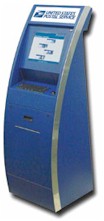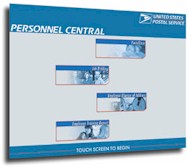News
USPS kiosk project to nearly double
May 22, 2005
 |
Last September, KIOSK magazine covered the U.S. Postal Service's "Personnel Central Kiosk" (PCK) initiative, which offers human resources information to postal workers without computer access in their work environment. The project, awarded to full kiosk solution provider Kiosk Information Systems (KIS), was originally for 310 kiosks placed in postal distribution centers nationwide.
Last month, based on the success of the project, USPS made the go ahead with an additional 300 kiosks. The project, now totaling over 600 kiosks, has become a major tool for Postal Service employees without computer access in their work environments use the terminals to perform basic human resources tasks including keeping track of benefits and viewing paycheck stubs. A privacy filter on the monitor enables workers to securely access personal information.
"The PCK project with the USPS demonstrates the important contribution kiosks make to the efficient delivery of human resources services to large workforces," said KIS President Rick Malone. "Kiosks are the preferred solution for companies seeking to extend HR services to dispersed employee populations."
KIS partner Netkey, Inc. is providing software support for the project, which includes an integrated collaborative database developed specifically for the U.S. Postal Service by KIS. Netkey's software allows for management and updating of kiosks from a single desktop.
Kiosk rationale
 |
Driven from the "disconnected worker" premise, the challenge the USPS faced was how to reach the 500,000 employees working in distribution centers and other postal facilities without direct access to desktop computers and the Internet.
While some employees use the organization's Interactive Voice Response (IVR) phone system, the USPS realized that cost benefits and efficiencies can be gained by extending the corporate HR intranet to these unconnected employees through self-service kiosks.
Research
www.usps.gov
www.kis-kiosk.com
www.netkey.com
Originally published in the Mar/Apr 2004 issue ofKiosk magazine.










